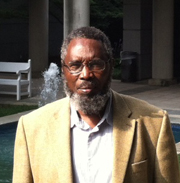Development Studies News
News from The Emory Program in Development Studies
Click here for PDF version.
September 26, 2012
Dr. Peter Gufu Oba Completes Sabbatical Year at Emory University
During the 2011 - 2012 academic year, Dr. Peter Gufu Oba was on sabbatical leave at Emory University as a Visiting Professor and Scholar in Development Studies. Before he returned to Norway, Anna Ellis, Graduate Assistant in Development Studies (and student in Master's in Development Practice program), talked with Dr. Oba about his year at Emory and his future plans. A summary of her interview follows:
Dr. Peter Gufu Oba grew up in a nomadic community in northern Kenya near the Ethiopian border, and was the first individual in the area to attend a university. He can be characterized by his passion and enthusiasm: for writing, continuing to invest in his home community in Northern Kenya, and his desire to connect the knowledge of the past to the present day.
The past sabbatical year in Atlanta at the Emory Program in Development Studies allowed Professor Oba the opportunity to finish two books. Surviving Climate Change focuses on the various ways that pastoral societies within the Horn of Africa have responded to climate changes over the last 12,000 years, chronicling adaptations which Dr. Oba believes may hold applicable lessons for future generations. Partition Nomads explores how different government and colonial powers in Kenya and Ethiopia created changing spatial divisions and definitions. Fluctuating international borders spawned conflict, as well as affected Borana pastoralists who lived along the now Northern Kenyan and southern Ethiopian border. By relating what he learned from colonial British, Italian, Ethiopian and Kenyan archives, with his oral histories from pastoralists, he provides the most thorough study available on African partition and colonization in the region and their impacts on surrounding Borana pastoralists, including the community where he lived as a young boy.
Gufu seeks to "link their [pastoralists'] experiences to the written archives", documenting "the transition from what was a pastoralist empire to a colonial empire." This book is personally important; Dr. Oba wants to honor the struggles of Borana ancestors who lived through the years of partition and colonial rule, passing on their stories to inform a younger generation. He maintains strong connections to his pastoralist upbringing and region. Dr. Oba says "I feel I have to serve as an example to the younger people, to show them that with education they too can do what I have." In addition to personifying perseverance and education, Gufu encourages these values through an annual competition for schools in northern Kenya, rewarding academic excellence with recognition and a substantial donation of funds to purchase books for establishing school libraries.
In his retirement, he desires to facilitate capacity building in his home community, helping younger generations to retain the valuable knowledge of their ancestors. In addition, he wants to focus on skills-building to encourage continuing adaptation to the shifting world economy and society. "I want to help people solve their own problems," Professor Oba says; with his drive and conviction, he has an excellent chance of success. And, indeed, the Emory Program in Development Studies was honored to be able to host him during his sabbatical leave in 2011-2012.
More about Dr. Oba:
 Professor Peter Gufu Oba has authored or co-authored more than 55 articles in scientific journals, including Human Ecology, Journal of Environmental Management, and Land Degradation and Development. Professor Oba, a Kenyan national, received his Ph.D. in Range Science from the University of Oslo in 1996, where he also held a post-doctoral fellowship in ecology during 1997-1999. He currently is Professor of International Environment and Development Studies, Norwegian University of Life Sciences. His work centers on studies of human ecology, East African pastoralism, development studies, arid and semi-arid ecosystems, local environmental knowledge systems, and environmental change. During his time at Emory, he completed a writing project on pastoralist ecology, development, and history of the Borana people in southern Ethiopia and northern Kenya entitled Nomads in the Shadows of Empires: Contests, Conflicts and Legacies on the Southern Ethiopian-Northern Kenyan Frontier.
Professor Peter Gufu Oba has authored or co-authored more than 55 articles in scientific journals, including Human Ecology, Journal of Environmental Management, and Land Degradation and Development. Professor Oba, a Kenyan national, received his Ph.D. in Range Science from the University of Oslo in 1996, where he also held a post-doctoral fellowship in ecology during 1997-1999. He currently is Professor of International Environment and Development Studies, Norwegian University of Life Sciences. His work centers on studies of human ecology, East African pastoralism, development studies, arid and semi-arid ecosystems, local environmental knowledge systems, and environmental change. During his time at Emory, he completed a writing project on pastoralist ecology, development, and history of the Borana people in southern Ethiopia and northern Kenya entitled Nomads in the Shadows of Empires: Contests, Conflicts and Legacies on the Southern Ethiopian-Northern Kenyan Frontier.
